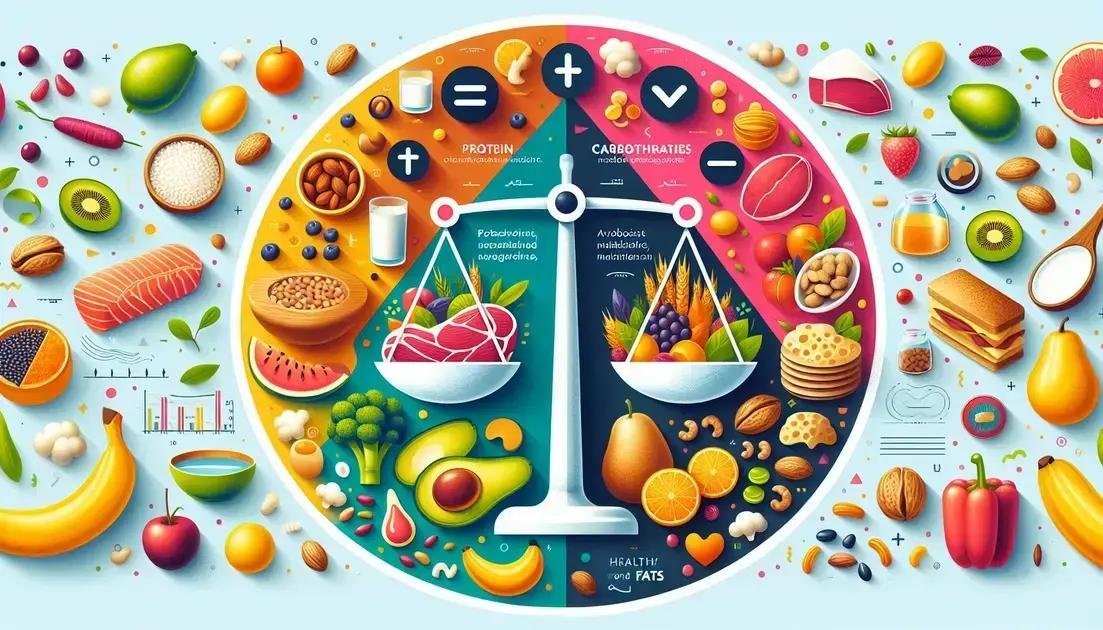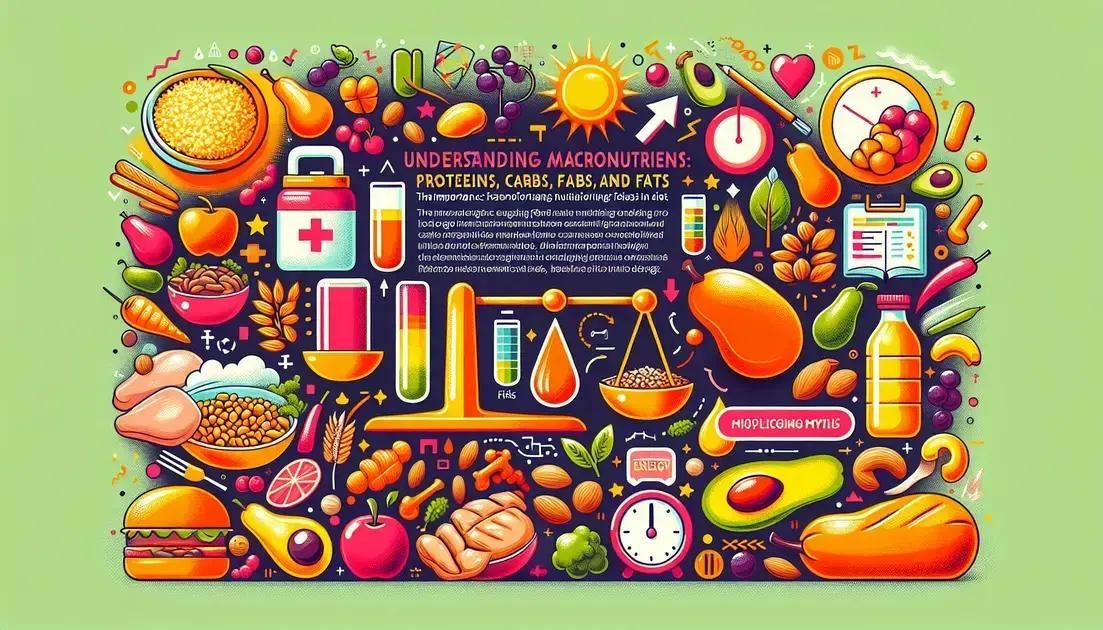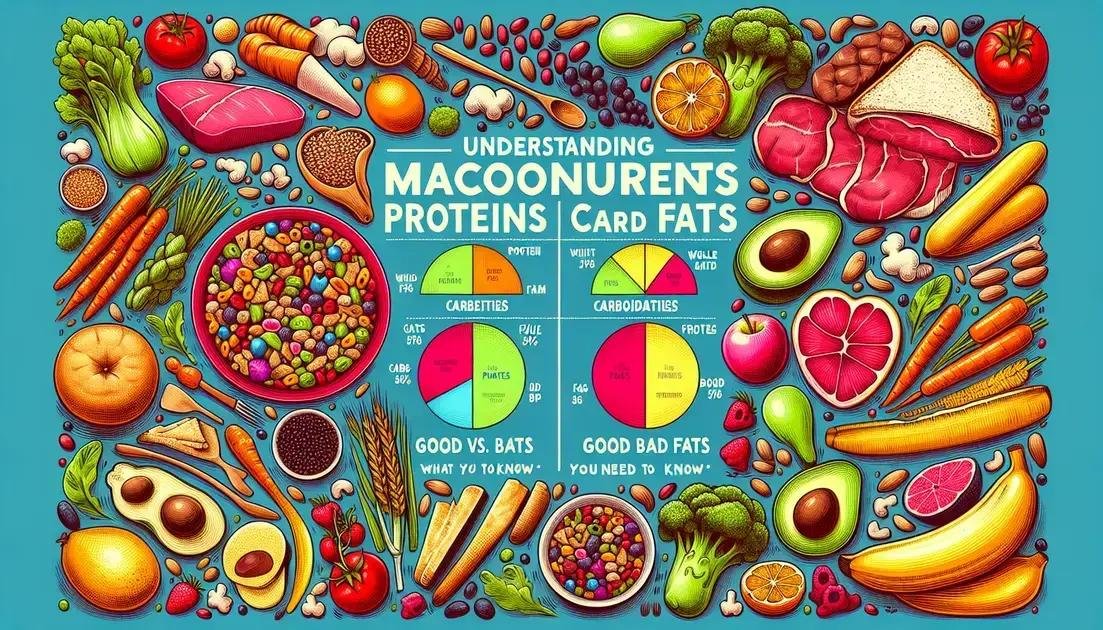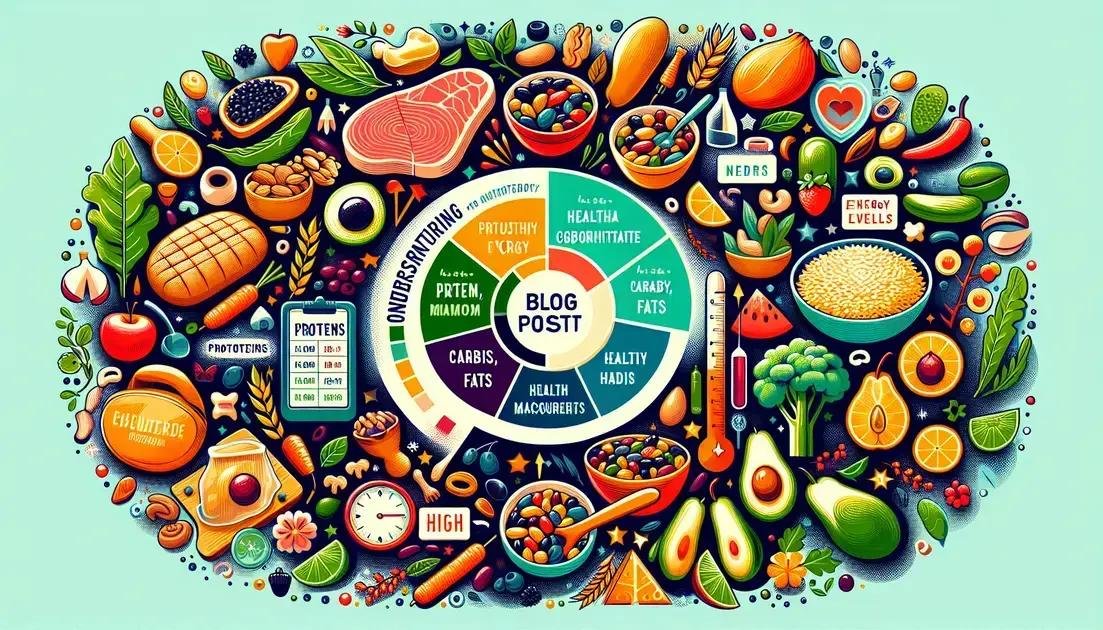
“Master Macronutrients: Fuel Your Lifestyle Effectively!”
-
Maria Duarte
-
8, janeiro, 2025
Topics
 Shared
Shared
Understanding macronutrients: proteins, carbs, and fats is crucial for a balanced diet and a healthy lifestyle.
Proteins help build muscles, carbs provide energy, and fats support cell function.
This guide explores their roles and how to balance them effectively.
Let’s dive into the world of nutrition and learn the importance of each macronutrient for our body’s needs.
What Are Macronutrients?
What Are Macronutrients?
Macronutrients are nutrients that provide energy and are essential for growth. They include proteins, carbohydrates, and fats. Each plays a unique role in maintaining health and supporting bodily functions.
For instance, proteins are important for muscle repair, carbohydrates are the body’s main energy source, and fats help absorb vitamins.
Role of Proteins in the Body
 Role of Proteins in the Body
Role of Proteins in the Body
Proteins are crucial for building and repairing tissues.
They are made of amino acids, which act as building blocks for muscles, skin, and organs.
The body needs proteins for growth, immune function, and the production of enzymes.
Consuming enough protein helps maintain muscle mass and supports overall health.
Understanding Carbohydrates: Energy Source
Understanding Carbohydrates: Energy Source
Carbohydrates are a major energy source for the body. They are found in foods like bread, rice, fruits, and vegetables. When consumed, carbs break down into glucose, which fuels our cells.
There are two types of carbohydrates: simple and complex. Simple carbs provide quick energy, while complex carbs offer sustained energy and important nutrients.
It’s vital to include healthy carbohydrates in your diet for effective energy management and overall health.
The Importance of Fats in Nutrition

The Importance of Fats in Nutrition
Fats are essential for various bodily functions. They provide a concentrated source of energy, supplying more calories per gram compared to proteins and carbohydrates.
Fats play a key role in absorbing fat-soluble vitamins like A, D, E, and K. They also contribute to hormone production and support cell structure.
There are different types of fats: saturated, unsaturated, and trans fats. Choosing healthy fats, like those from nuts, seeds, and fish, is crucial for overall health and wellness.
Balancing Protein, Carbs, and Fats
Balancing Protein, Carbs, and Fats
To maintain good health, it’s important to have a balanced diet that includes proteins, carbohydrates, and fats. Each macronutrient plays a different role.
Proteins support muscle repair and growth, carbohydrates provide quick energy, and fats help absorb vitamins. A balanced plate might include a source of protein, healthy carbs, and good fats.
For example, a meal could consist of grilled chicken (protein), brown rice (carbs), and avocado (healthy fat). Understanding how to balance these nutrients according to personal activity level and health goals can significantly impact overall wellness.
Protein-Rich Foods to Include in Your Diet

Protein-Rich Foods to Include in Your Diet
Including protein-rich foods in your diet is essential for health. Great sources of protein are lean meats like chicken and turkey. Fish, eggs, beans, lentils, and nuts also provide ample protein. Dairy products like yogurt and cheese are beneficial too. Choosing a variety of these foods helps meet protein needs.
For example, starting the day with eggs or a smoothie with protein powder can boost your intake. Incorporating beans in salads or choosing grilled chicken for lunch adds protein to your meals. Always aim for a good mix of these options to support your body’s growth and repair needs.
Healthy Sources of Carbohydrates
Healthy Sources of Carbohydrates
Healthy carbohydrates are vital for energy and overall health. They can be found in whole grains, fruits, and vegetables. Whole grains like brown rice, quinoa, and oatmeal provide fiber, which is good for digestion.
Fruits, such as bananas, apples, and berries, offer natural sugars along with vitamins and minerals. Dark leafy greens and colorful vegetables like sweet potatoes and carrots also count as healthy carbs.
Incorporating these foods into your diet not only helps maintain energy levels but also provides essential nutrients. Swapping white bread for whole grain options or snacking on fresh fruit instead of processed sweets is a great way to enjoy nutritious carbohydrates.
Good vs. Bad Fats: What You Need to Know

Good vs. Bad Fats: What You Need to Know
Fats are not all created equal. Good fats, or healthy fats, include unsaturated fats found in olive oil, avocados, and nuts. These fats can help improve cholesterol levels and reduce the risk of heart disease.
Bad fats, such as trans fats found in many processed foods, can raise bad cholesterol levels and contribute to health issues.
It’s important to focus on consuming sources of good fats while limiting or avoiding bad fats. Reading food labels and choosing whole, natural foods are effective strategies to manage fat intake.
By making informed choices, you can support better heart health and overall wellness.
How Macronutrients Affect Weight Management
How Macronutrients Affect Weight Management
Macronutrients play a key role in weight management. Balancing proteins, carbohydrates, and fats helps regulate appetite and energy levels.
Protein is particularly important for building muscle, which can increase metabolism. Carbohydrates provide fuel for physical activity, while healthy fats are necessary for nutrient absorption.
When you consume too many calories from any macronutrient, it can lead to weight gain. Understanding individual needs helps tailor a diet to promote weight loss or maintenance.
Monitoring portion sizes and choosing nutrient-dense foods can greatly impact overall weight management success.
Macronutrients for Optimal Energy Levels

Macronutrients for Optimal Energy Levels
Macronutrients are vital for maintaining energy levels throughout the day. Carbohydrates are the body’s primary energy source, breaking down into glucose for fueling physical activity. Proteins assist in repairing tissues and building muscle, which can also impact how efficiently the body uses energy. Fats provide a concentrated energy source and are important for long-lasting fuel.
A balanced intake of all three macronutrients can help sustain high energy levels. Including foods like whole grains, lean proteins, and healthy fats in your meals ensures that your body receives the energy necessary for daily activities and exercise.
Common Myths about Macronutrients
Common Myths about Macronutrients
There are several misunderstandings about macronutrients that can affect dietary choices. One common myth is that all fats are bad for you. In reality, healthy fats are crucial for various body functions.
Another myth suggests that carbs should be completely avoided for weight loss. However, carbohydrates are an important energy source that the body needs.
Another misconception is that high-protein diets are harmful for everyone. While individuals with certain health conditions should monitor protein intake, many people can benefit from increased protein in their diets.
Understanding these myths can help guide better nutritional choices.
Creating a Balanced Nutritional Plan
 Creating a Balanced Nutritional Plan
Creating a Balanced Nutritional Plan
Creating a balanced nutritional plan is key to maintaining good health. Start by including a variety of foods from all three macronutrient groups: proteins, carbohydrates, and fats. Ensure your meals consist of lean proteins like chicken or fish, whole grains for carbohydrates, and healthy fats such as avocado or olive oil.
It’s important to consider portion sizes and to listen to your body’s hunger and fullness cues. Planning meals ahead of time can help you stay on track. Aim for colorful plates with fruits and vegetables to provide essential vitamins and minerals.
Regularly review your plan and adjust it according to your activity levels, health goals, and nutritional needs. With balance and variety, you can create a sustainable eating plan that supports your overall well-being.
Conclusion
Understanding macronutrients is essential for making informed dietary choices.
By recognizing the roles of proteins, carbohydrates, and fats, you can create a balanced nutritional plan that promotes overall health.
Incorporating diverse sources of these macronutrients ensures adequate energy levels, muscle repair, and nutrient absorption.
As you navigate the world of nutrition, dispelling common myths and focusing on balance can lead to better wellness outcomes.
Frequently Asked Questions about Macronutrients
What are macronutrients?
Macronutrients are nutrients that provide energy and are essential for growth, including proteins, carbohydrates, and fats.
What is the role of proteins in the body?
Proteins are crucial for building and repairing tissues and play a vital role in muscle growth.
Why are carbohydrates important?
Carbohydrates are the body’s main energy source, breaking down into glucose for fueling activities.
Why are fats essential in our diet?
Fats provide a concentrated source of energy and are necessary for absorbing certain vitamins.
How can I balance protein, carbs, and fats in my diet?
Aim to include a variety of foods from each macronutrient group in balanced portions.
What are good sources of protein?
Good sources include lean meats, fish, eggs, beans, and dairy products.
What are healthy sources of carbohydrates?
Include whole grains, fruits, and vegetables for healthy carbohydrates.
What is the difference between good and bad fats?
Good fats, like unsaturated fats, are beneficial, while bad fats, like trans fats, can be harmful.
How do macronutrients affect weight management?
Balancing macronutrients helps regulate appetite and supports weight management goals.
How do macronutrients impact energy levels?
A balance of macronutrients provides the necessary energy for daily activities and exercise.
What are some common myths about macronutrients?
Common myths include that all fats are bad and that carbs should be avoided for weight loss.
How can I create a balanced nutritional plan?
Include a variety of foods from all macronutrient groups and monitor portion sizes.
 Return blog
Return blog